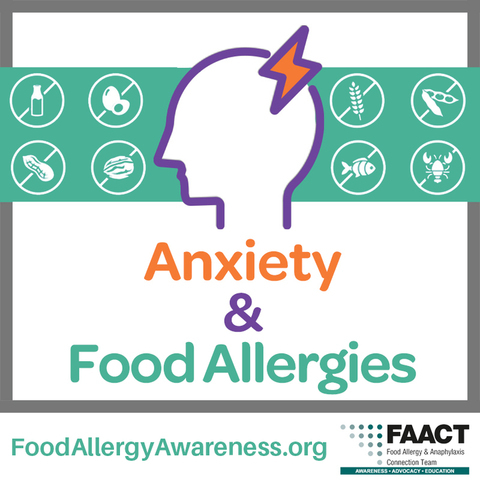Anxiety and Food Allergies

The FAACTs about Anxiety and Food Allergies
What is anxiety? What are anxiety disorders?
The American Psychology Association defines anxiety as, “An emotion characterized by feelings of tension, worried thoughts and physical changes like increased blood pressure.”
The National Institute of Health (NIH) defines an anxiety disorder as, “Anxiety disorders involve more than temporary worry or fear. For a person with an anxiety disorder, the anxiety does not go away and can get worse over time. The symptoms can interfere with daily activities such as job performance, school work, and relationships.”
Anxiety is a necessary part of life, so it is important to look at anxiety through a healthy lens. To an extent, having mild anxiety is an asset as it makes one more cautious when reading labels, ordering out, and may motivate one to carry one’s epinephrine etc. Still, children, teens, and young adults with food allergies are at a much higher risk for anxiety related disorders and feelings of worry. Anxiety that has gotten out of control can be managed with the right tools and supports.
What might anxiety look like?
Symptoms are different for everyone, and can include a range of symptoms. Below are some ways anxiety can manifest:
- Sweating
- Rapid heartbeat/trouble breathing
- Panic Attacks
- Stomach ache/headache/other physical symptoms/frequent visits to the school nurse
- Irritability/outbursts/restlessness
- Sleep issues
- Uncontrollable worry
- Recurring fears regarding everyday life tasks
- Avoidance of activities
- Perfectionist tendencies
- Meltdowns
Anxiety often comes from a perceived threat (one that often is imaginary). For those with food allergies... the threat is very real. Particularly troubling for those who have been diagnosed with food allergies, some symptoms of anxiety (e.g. trouble breathing or physical symptoms) can mirror those of an allergic reaction, further increasing anxiety. Exposure to stressful/negative life or environmental events in early childhood or adulthood can lead to developing anxiety, naturally, this may include a bad or anaphylactic reaction.
What can I do?
- When developing your child as a self-advocate, it is important to include exercises that could reduce your child's anxiety (e.g. making own cookbooks, role-playing, and adopting an overall positive outlook on the condition of food allergies).
- Normalize mental health issues and eliminate any stigma.
- Make self-care a priority in your household.
- Model: Remember, especially if your children are younger, they are looking to you as an example on how to practice healthy ways of thinking about their food allergies, how to react to challenging situations, and how to incorporate self-care habits.
- Learn coping strategies to effectively begin reducing anxiety!
If your child comes to you in a stressful or anxious moment, validate that some things are hard and uncomfortable. After you validate, help your child remember when things went right by giving them evidence of their prior safe experiences (dining out successfully, attending a birthday party with no issues, having a family meal etc.).
Download The FAACTs about Anxiety and Food Allergies handout

